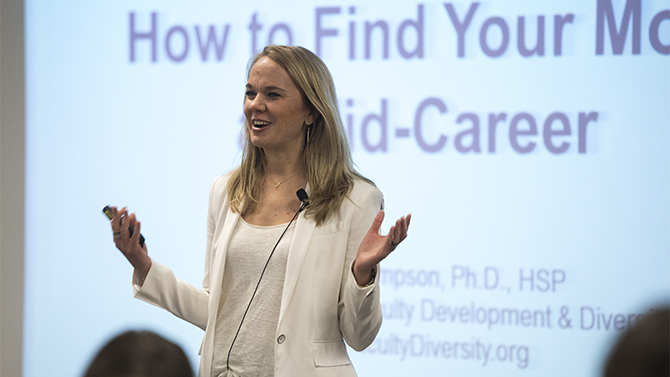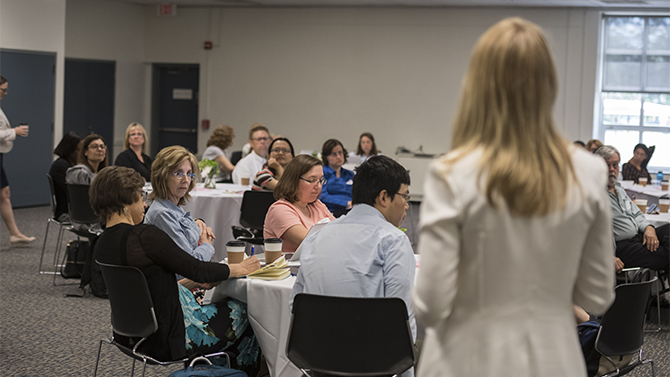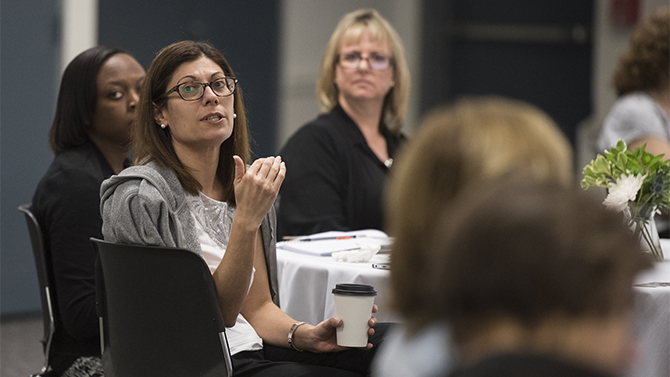

'Writing Your Next Chapter'
Photos by Kathy F. Atkinson July 12, 2017
UD hosts workshop for mid-career faculty members
About 50 University of Delaware faculty members came together last month for a nationally-celebrated half-day workshop aimed at mid-career faculty.
The workshop was sponsored by the UD Faculty Achievement Program along with UD ADVANCE, the College of Arts and Sciences, the College of Engineering and the Office of the Vice Provost for Diversity.
Mindi Thompson, a certified workshop leader with the National Center for Faculty Development and Diversity (NCFDD) and leader of NCFDD’s coaching team, delivered a presentation titled “Writing Your Next Chapter.”
Thompson’s presentation covered many aspects of the NCFDD’s core curriculum, focusing in particular on challenges faced by associate professors as they navigate mid-career terrain. Central to the workshop was a message of identifying the pathway and career development that is right for you.
As Thompson pointed out during the workshop, tenure-track assistant professors are laser-focused on the goal of “getting tenure,” following whatever their department’s criteria are.
For associate professors, the number of career pathways widen: they can choose to become a teaching superstar, a research maven, a public intellectual; they can take on intensive mentoring work, move into administrative roles, or even take on new kinds of activism and leadership locally and/or nationally.
She said the sheer variety of these possible career trajectories and the attractiveness of multiple options can sometimes lead faculty at mid-career to get stuck because they haven’t gotten clear for themselves what their trajectory is, and they haven’t prioritized their time according to their highest priority work, whether that is their writing, developing new and innovative teaching materials and opportunities, or growing as a professional in the ways that are most important and desirable.
Sharing challenges
At the workshop, participants shared some of their own challenges. Notable among the comments was a sense of feeling bogged down by incessant demands on their time.
Participants mentioned, for instance, time-consuming work applying for grants in order to maintain funding cycles while not having the time to produce manuscripts and articles from existing and ongoing grant data; the volume of time spent training and mentoring graduate and undergraduate students; and ever-increasing requests for national service, committee work, faculty governance, and other labor that keeps departments and units running smoothly.
These external pressures can feel untenable for associate professors who perceive these demands to be at odds with their desired next-step career pathway. As one participant asked, “What if my pathway doesn’t line up with the demands of my institution?”
In response to these challenges, Thompson emphasized that these are incredibly common challenges, and moved participants through the NCFDD’s approach to teaching and supporting faculty to identify their pathways and make use of the vast array of resources on the organization’s website – all available to UD faculty through its institutional membership.
Thompson articulated several key strategies that participants might use to keep themselves moving towards the productivity that they seek, and concluded the workshop by urging participants to identify one thing that they are willing to experiment with and try as they head into summer.
Academics, she pointed out, often feel powerless at various stages of their careers. But while they may be vulnerable in some ways, that vulnerability does not mean they are powerless to effect changes in what they do and how they do it.
Contact Us
Have a UDaily story idea?
Contact us at ocm@udel.edu
Members of the press
Contact us at mediarelations@udel.edu or visit the Media Relations website




